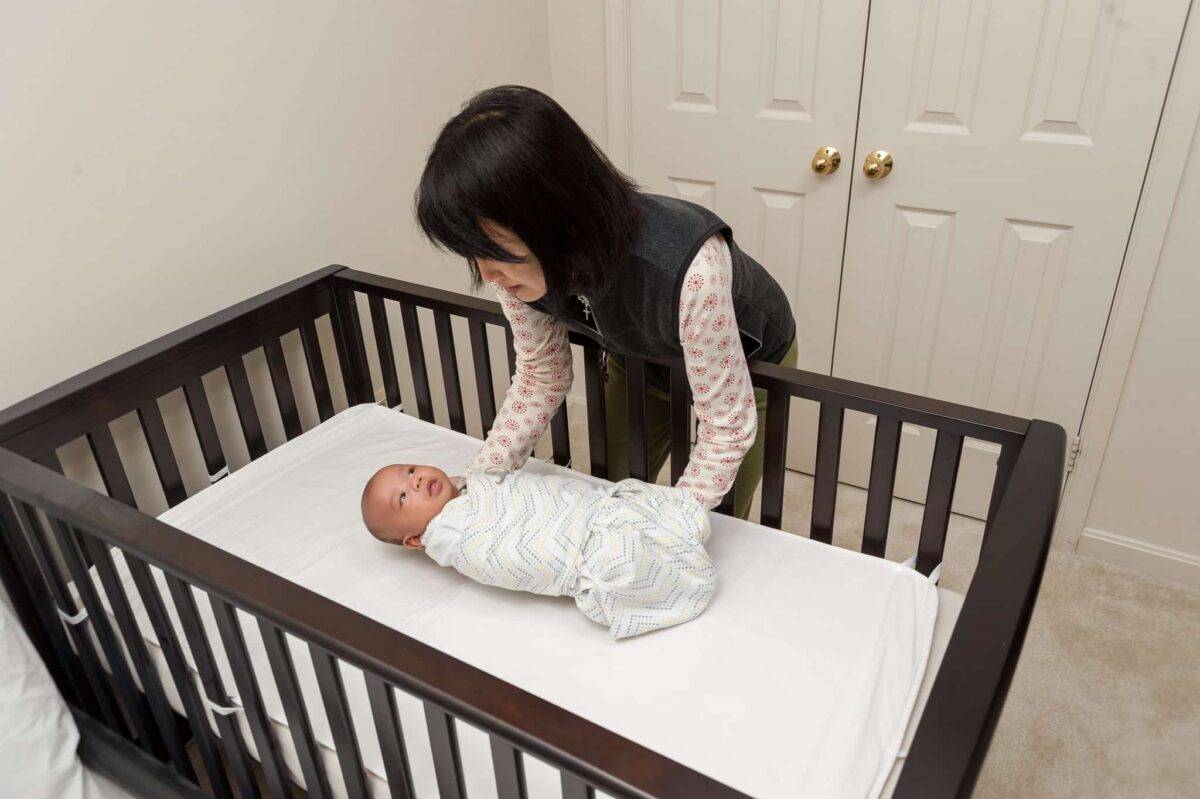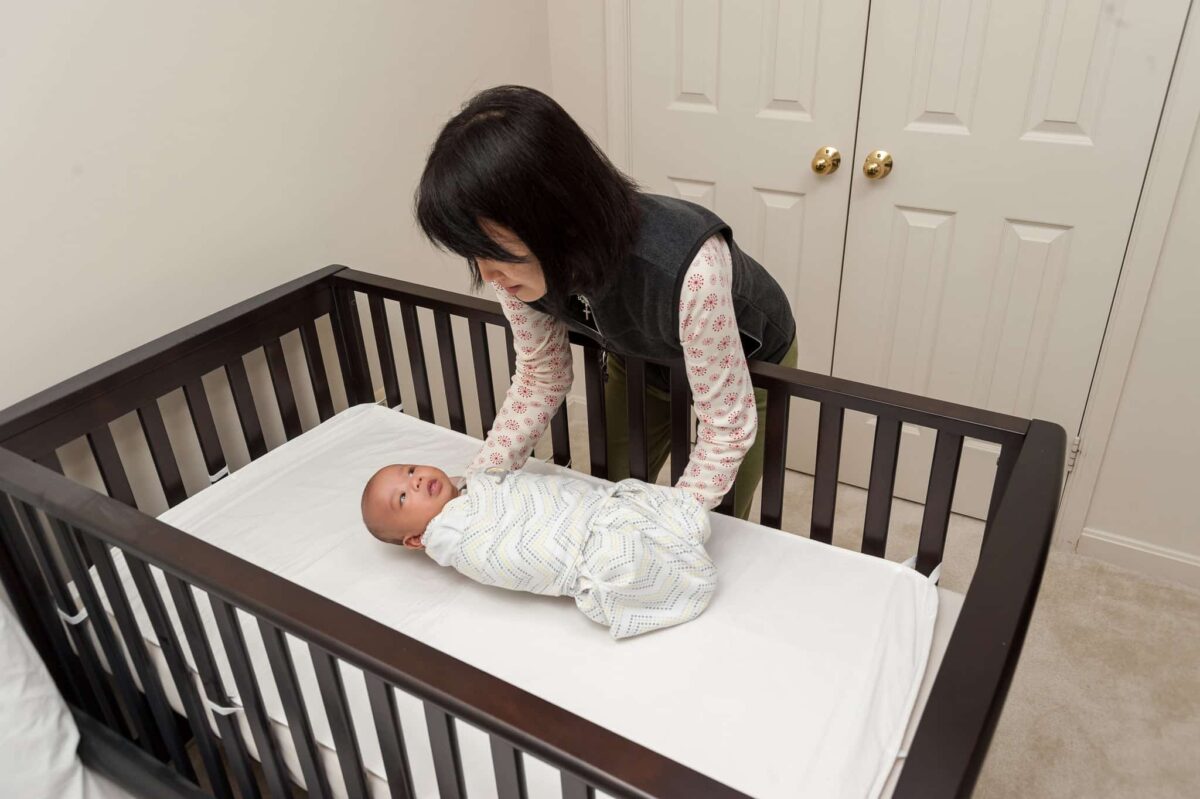Infant sleep and brain development

This post is part of our series on Infant Sleep and its Impacts on Development, published in collaboration with the journal Infant Behavior and Development. The featured research appeared in a special issue on how infant sleep affects cognitive, social, and physical development and how parents and practitioners can help promote healthy sleep and development in infancy.
Key takeaways for caregivers
- Before their first birthday, most infants sleep 12 hours a day and can sleep through the night.
- Infants who had good-quality and sufficient night sleep at eight months had better language development and greater cognitive skills at 14 months.
- Infants with good sleep quality had higher morning cortisol levels than those with lower-quality sleep, which may reflect more mature brain organization.
- Because sleep promotes learning and brain development, caregivers should learn sleep routines and strategies that help babies learn how to sleep through the night.
The sleep-wake circadian cycle and learning
In the early months, newborns sleep about 75% of a 24-hour day. By nine months, they sleep about 50% of a 24-hour cycle. A circadian rhythm (or inner clock-like signals) develops during the first year to establish an adult-like pattern of being awake during the day and asleep at night. However, after their first birthday, about 20% to 30% of toddlers continue to have night wakings or poor night sleep.

Photo: NICHD. Creative Commons.
Sound infant sleep is important for healthy development. Research suggests that the quantity and quality of infants’ sleep are linked to learning and brain development. For example, babies who sleep for shorter periods have poorer memories, and infants who have difficulty sleeping at night have trouble remembering new words.
Sleep and stress response cycles
While developing a sleep-wake cycle, infants’ circadian rhythm also develops to respond to stress. When stress is perceived, a cycle starts that releases cortisol, a stress hormone that provides a boost of stored energy to help the body get through the stressor. The extra boost helps the individual deal with the stressor through the fight or flight response.
Stressors are not always extreme or intense in nature. For example, infants often show distress when crying and fidgeting during a diaper change, when overstimulated, or when hungry or sleepy. Every interaction and change in an infant’s day can be a stressor and can lead to a cortisol response that helps prepare the body to respond to stress.
Optimal sleep (i.e., sleeping sufficiently and soundly through the night) at eight months was associated with higher learning and language skills at 14 months.
Cortisol becomes unhealthy when it is repeatedly released and remains elevated. Such elevated levels have been linked to poor learning and functioning, suggesting that too much cortisol may harm brain development.
In adults, cortisol levels are typically high in the morning, decrease steadily over the day, and are low at night as sleep approaches. Infants are thought to mimic the adult day-night cortisol circadian rhythm; however, few studies have explored the relation between infants’ cortisol and sleep cycles.
Do infant sleep and cortisol relate to later language and learning skills?
We conducted a study to better understand if infants’ quality of sleep relates to their later language development and overall learning abilities. The infants were White and from middle-class families, and they attended a high-quality childcare program in a southeastern state in the United States.
When babies reached eight months and again at 14 months, parents answered questions related to their infants’ sleep routine, sleep environment, and the quality and quantity of their babies’ sleep. At both time points, the child care provider completed assessments of the infant’s communication and language skills (e.g., nods head to indicate yes, uses sounds/words to get attention) and learning and cognitive skills (e.g., imitates, looks, or points to an object when asked where it is).
To begin to explore the role of cortisol levels in the connection between sleep and learning in the early years, we also collected morning saliva from the babies at both time points.
Infants with better night sleep had better language and cognitive abilities as toddlers
In our study, we asked whether babies who had regular sleep routines and good nighttime sleep developed better language and learning/cognitive skills than babies with irregular sleep routines and poor nighttime sleep. We found that optimal sleep (i.e., sleeping sufficiently and soundly through the night) at eight months was associated with higher learning and language skills at 14 months. These findings suggest that achieving good quality and quantity of sleep before the first birthday may relate to young infant’s later language development and overall learning.

Photo: hessam nabavi. Unsplash.
Higher morning cortisol stress hormone levels related to better toddler sleep
We also looked at whether morning cortisol stress hormone levels of 14-month-olds were related to sleep at the same age. We found that toddlers who had optimal night sleep also had the highest morning cortisol stress hormone levels. In adults, cortisol levels tend to be higher shortly after waking. Thus, the higher cortisol levels in toddlers may indicate more mature brain development in toddlers who had better nighttime sleep.
Sleep enhances early brain development
Our findings showed that optimal sleep in infancy was associated with better language and learning skills in toddlerhood. These results are consistent with the idea that sleep enhances early brain development. One explanation for why sleep helps an infant’s brains develop is that sleep triggers the release of brain chemicals, or neurotransmitters, that build and strengthen the brain’s pathways for forming memories of information an infant learned that day.
Good sleep also prepares infants to learn the next day. Young infant’s learning opportunities typically occur through daytime interactions. When infant’s have slept well, they may wake up more relaxed and ready to engage. In contrast, infants who have not slept well may awaken sluggish, irritable, and less ready to socialize and learn. Because sleep is important for solidifying past learning and preparing children to learn even more, caregivers should help infants and toddlers achieve restful, continuous sleep at night.
How can parents support their children’s brain development?
Caregivers can help infants achieve restful sleep by establishing routines at home that start at about the same time each day and signal to the baby that nighttime sleep is approaching. For example, after the last nursing or bottle feeding of the day, parents might use calming strategies to promote greater infant relaxation, such as giving a warm bath, singing a lullaby, reading a quiet story, and providing a massage.
Caregivers should help infants and toddlers achieve restful, continuous sleep at night.
Parents should try to decrease environmental stimulation to help their infant shift from being awake and active to being relaxed and ready for a long sleep. Dark, quiet, screen-free, calm places are considered good sleeping environments for young infants.
If babies wake up during the night, parents can use strategies to help infants self-regulate and fall back asleep. Parents should understand each infant’s unique sleep needs and should not assume that all babies will respond similarly to an evening routine. For example, infants with health conditions, neurodevelopmental issues, and trauma often have disrupted sleep. Caregivers of these infants may need additional help to learn how to develop effective sleep routines for their infants.
In summary, parents’ sensitivity to young infant’s individual needs while developing their sleep routines should help babies achieve good, restful sleep at night so that when babies are awake, they are ready to learn and develop new skills. Good, restful sleep may lead to more mature brain development in the early years, which may be measured by higher morning cortisol levels.
















Leave a comment